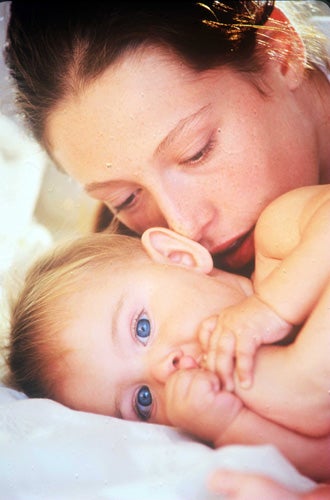Mothers bond better with babies after natural births

Your support helps us to tell the story
From reproductive rights to climate change to Big Tech, The Independent is on the ground when the story is developing. Whether it's investigating the financials of Elon Musk's pro-Trump PAC or producing our latest documentary, 'The A Word', which shines a light on the American women fighting for reproductive rights, we know how important it is to parse out the facts from the messaging.
At such a critical moment in US history, we need reporters on the ground. Your donation allows us to keep sending journalists to speak to both sides of the story.
The Independent is trusted by Americans across the entire political spectrum. And unlike many other quality news outlets, we choose not to lock Americans out of our reporting and analysis with paywalls. We believe quality journalism should be available to everyone, paid for by those who can afford it.
Your support makes all the difference.Women who have a natural birth form stronger bonds with their babies than those who deliver by Caesarean section, researchers say.
Stimulation of the cervix and vagina during natural birth releases hormones that generate powerful feelings critical to a woman's performance as a mother immediately after delivery.
But a Caesarean delivery in which the baby is removed from the womb via a surgical incision in the abdominal wall alters the "neurohormonal experience" of birth, increasing the risk that mother and baby will fail to bond.
The finding, by American researchers, will raise new concerns about the high numbers of Caesarean births in the UK and other Western countries. The rising age of mothers, a "safety first" medical culture and fears of litigation have seen rates more than double in the UK in the past 20 years. Caesareans now account for one in five of all births.
Doctors from the Child Study Centre at Yale University, who used brain scans to study the brain activity of 20 first-time mothers, found those who had delivered vaginally were more responsive to their baby's cry two to four weeks after delivery. Those who delivered by Caesarean were less responsive.
Studies in animals , including rats and horses, have shown that when they have a Caesarean delivery they are less likely to demonstrate maternal behaviour towards their offspring. Uterine contractions trigger the release of oxytocin, which is known to play a key role in producing maternal behaviour in animals.
The researchers have shown that something similar appears to happen in humans. The regions of the brain studied, which showed higher activity after natural birth, were those believed to regulate emotions, motivation and habitual behaviour and are critical to enable parents to care successfully for their babies.
James Swain, lead author of the study published in The Journal of Child Psychology and Psychiatry, said: "We wondered which brain areas would be less active in parents who delivered by Caesarean section, given that this mode of delivery has been associated with decreased maternal behaviours in animal models and a trend for increased postpartum depression in humans.
"Our results support the theory that variations in delivery conditions such as with [a] Caesarean... might decrease the responsiveness of the human maternal brain in the early postpartum."
The study involved 12 new mothers who were having their first baby, six of whom had a vaginal delivery and six a Caesarean "planned for convenience". The mothers listened to recorded cries of their babies two to four weeks after delivery. Dr Swain said: "More women wait until they are older to have children, and by association [are] more likely to have a Caesarean delivery. These results are important because they could provide better understanding of the basic neurophysiology and psychology of parent-infant attachment."
The research could lead to early detection of families at risk of postnatal depression and attachment problems, he said.
Belinda Phipps, chief executive of the National Childbirth Trust, said that bonding between mother and baby was extremely important. "Women who have a Caesarean should be encouraged to cuddle their newborn against their skin straight after birth and be offered help to feed and care for their baby. A Caesarean section is necessary in some cases and can save lives – however, surgery can create more problems than it solves."
Join our commenting forum
Join thought-provoking conversations, follow other Independent readers and see their replies
Comments